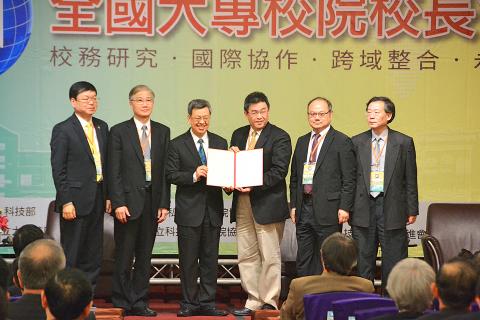Five higher education associations yesterday issued a joint statement calling on President Tsai Ing-wen (蔡英文) to address a perceived “drought” in the nation’s talent pool in the same way she handles matters of national security, saying Taiwan is being “sidelined” by the international community in the field of higher education.
The statement was signed by National Taiwan University president Yang Pan-chyr (楊泮池), head of the Association of National Universities of Taiwan; Chinese Culture University president Lee Tien-rein (李天任), head of the Association of Private Universities and Colleges; National Taiwan University of Science and Technology president Liao Ching-jong (廖慶榮), head of the Association of National Universities of Science and Technology of Taiwan; Lunghwa University of Science and Technology president Ko Tzu-hsiang (葛自祥), head of the Association of Private Universities and Colleges of Technology; and Jen-Teh Junior College of Medicine, Nursing and Management president Huang Po-hsian (黃柏翔), who heads the Alliance of Junior Colleges.
The statement was issued on the second day of a meeting between the Ministry of Education and university and college heads in Kaohsiung.

Photo: Wu Po-hsuan, Taipei Times
Challenges facing tertiary institutions include falling enrollment rates; a lack of resources; a discrepancy between what students learn and what the private sector needs; how to better compete with overseas counterparts; and translating their achievements into a competitive edge for the nation, the statement said.
The nation’s higher education sector has been sidelined in the international arena because it lacks a solid and effective road map, it said, citing the government’s diffuse development plans.
The nation is not injecting enough capital into higher education, the statement said, citing the budget of National Taiwan University, the nation’s most prominent university, which is roughly equivalent to that of China’s Lanzhou University, leading to an exodus of outstanding students.
The associations called on Tsai to order the Executive Yuan to form an advisory committee and draw up a road map to cultivate talent amid low enrollment rates.
The government should lay out provisional guidelines for the next three to five years to provide incentives to universities positioned to reinvent themselves and case-by-case guidance to institutions that are facing closure due to sliding enrollment rates, they said.
At the meeting, Liao requested that Vice President Chen Chien-jen (陳建仁) raise subsidies granted to universities of science and technology to the level provided other universities.
Tuition charged by private universities is nearly twice that of their public counterparts, Feng Chia University president Lee Bing-Jean said, asking Chen to address the issue by increasing the nation’s education budget to provide more subsidies to private institutions, allowing them to reduce tuition fees.
The education budget was increased 0.5 percent this year, Chen said, adding that further budget increases would be deliberated after factoring in the needs of other areas of development.
The government will ensure that the ministry’s policies are formulated in a way that covers the needs of all students and improves their learning environment, he said.
The ministry is working on a higher education road map to ensure a fairer distribution of subsidies, Minister of Education Pan Wen-chung (潘文忠) said, adding that funds would primarily be spent on improving students’ learning.
Pan on Thursday said the ministry would seek to curtail the weight given to university evaluations when deciding subsidies for institutions to ameliorate a problem of universities proposing similar research projects in an attempt to win more funds, which he said made higher education “homogenous.”

The Coast Guard Administration (CGA) yesterday said it had deployed patrol vessels to expel a China Coast Guard ship and a Chinese fishing boat near Pratas Island (Dongsha Island, 東沙群島) in the South China Sea. The China Coast Guard vessel was 28 nautical miles (52km) northeast of Pratas at 6:15am on Thursday, approaching the island’s restricted waters, which extend 24 nautical miles from its shoreline, the CGA’s Dongsha-Nansha Branch said in a statement. The Tainan, a 2,000-tonne cutter, was deployed by the CGA to shadow the Chinese ship, which left the area at 2:39pm on Friday, the statement said. At 6:31pm on Friday,

The Chinese People’s Liberation Army Navy’s (PLAN) third aircraft carrier, the Fujian, would pose a steep challenge to Taiwan’s ability to defend itself against a full-scale invasion, a defense expert said yesterday. Institute of National Defense and Security Research analyst Chieh Chung (揭仲) made the comment hours after the PLAN confirmed the carrier recently passed through the Taiwan Strait to conduct “scientific research tests and training missions” in the South China Sea. China has two carriers in operation — the Liaoning and the Shandong — with the Fujian undergoing sea trials. Although the PLAN needs time to train the Fujian’s air wing and

Taiwanese celebrities Hank Chen (陳漢典) and Lulu Huang (黃路梓茵) announced yesterday that they are planning to marry. Huang announced and posted photos of their engagement to her social media pages yesterday morning, joking that the pair were not just doing marketing for a new show, but “really getting married.” “We’ve decided to spend all of our future happy and hilarious moments together,” she wrote. The announcement, which was later confirmed by the talent agency they share, appeared to come as a surprise even to those around them, with veteran TV host Jacky Wu (吳宗憲) saying he was “totally taken aback” by the news. Huang,

The American Institute in Taiwan (AIT) put Taiwan in danger, Ma Ying-jeou Foundation director Hsiao Hsu-tsen (蕭旭岑) said yesterday, hours after the de facto US embassy said that Beijing had misinterpreted World War II-era documents to isolate Taiwan. The AIT’s comments harmed the Republic of China’s (ROC) national interests and contradicted a part of the “six assurances” stipulating that the US would not change its official position on Taiwan’s sovereignty, Hsiao said. The “six assurances,” which were given by then-US president Ronald Reagan to Taiwan in 1982, say that Washington would not set a date for ending arm sales to Taiwan, consult